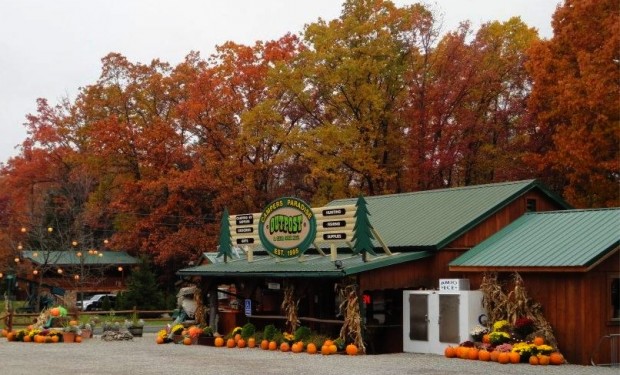
Starting a campground is a massive undertaking for anyone, but what if there was a slightly less expensive way of going about it?
Small Business Trends recently spoke to Andrea Steele, co-owner of Camper’s Paradise in Sigel, Pennsylvania. Steele’s family gave up everything – including high-pressure, high-paying jobs – to spend more time together and teach their children the value of hard work and determination.
The family had no idea just how hard that work would be.
Andrea’s husband, Mike, was a superintendent in a coal mine. Despite the great benefits and pay, Mike was tired of company politics, so Andrea, in great faith, told him to quit.
After spending about a year looking for a campground to purchase, the couple and their two school-age boys gave up their award-winning Victorian home, which they had renovated themselves, and set about building a whole new life.
In January 1995, the Steeles made their big purchase. By that Spring, Camper’s Paradise was already up and running, but it was a long winter.
“We didn’t even have a house to live in. We lived in our camper through the winter. We had no water, and had to drive up to the bathhouse and clean out a stall to use. We started from nothing, really,” Andrea said.
The First Step – Location
The secret for how to start a campground with this family was to find a foundation that had already been laid and build from the ground, up.
When the Steeles discovered their would-be campground, there wasn’t much to write home about. But Andrea saw beauty in the mess. It was little more than an old campground in decay.
“I could see the potential of it,” she says. “It was a dump, but I could see the potential. It had beautiful property. So we put our house on the market and sold it in one week for cash.”
Before the property could start looking anything like the family-friendly campground the Steeles envisioned, Andrea and Mike had to tackle the bare-bones basics.
The Second Step – Infrastructure
“We had to redo the whole infrastructure,” Andrea explains. “All the electrical lines were above-ground, so we had to lay them underground. There was water in the ground with no conduit. We had to go through DEP (Pennsylvania Dept. of Environmental Protection) and that was a nightmare.”
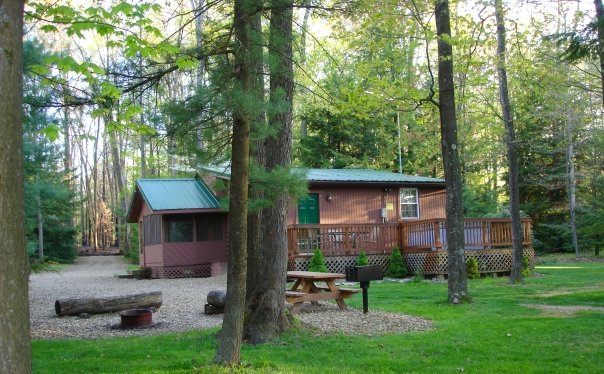
The couple then had to deal with the gas lines. The Steeles told the gas company they’d have to bury their lines, so the company put in roads.
“The original campground already had septic tanks, which was very cost-saving,” Andrea says.
Third Step – Lodging
While the gritty work of rebuilding took place, Andrea and Mike were also busy securing more land. With over 100 available private camps located directly across the street from what would become Camper’s Paradise, the Steeles started purchasing parcels for their cabins.
They quickly went from having just 24 sites to 115. Today, the sites house nine cabins, a manager’s house, a pool, pavilion, extensive playground (built by the Steele family) and the Steeles’ own log home.
Fortunately for the Steeles, the whole family is pretty handy, which meant that much of the building and rebuilding could be done by them, without the hassle of hiring contractors, dealing with bids or worrying that the people they hired wouldn’t have the same vision for their business.
Saving money was important to a family who had given up everything to pursue their dream, but they wanted their work to be top-notch. What they would have spent on contractors they put into materials.
“When we were building things, we didn’t cut corners. We put in top-grade materials. My family is very handy. We didn’t have to hire out,” Andrea says.
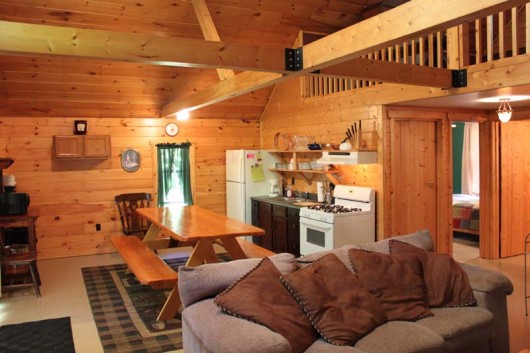
Andrea admits that it was considerably easier to start a campground in 1995 than it is today. The family was able to avoid all sorts of pitfalls that plague campground entrepreneurs today.
Be Sure to Check Into the Details First
“We didn’t need many permits. But today — oh, my gosh — I can’t even imagine what it would cost to purchase the land,” she says. “To start a campground — and this is hard to believe — it’s about $15,000 to put in a site. That’s what a friend of ours – a campground engineer — told us.”
The cost for permits varies from municipality to municipality. In the state of Pennsylvania, this was not always the case. Until about the late 1970s or early 1980s, the price and process of securing the necessary campground permits was universal across the state, according to Beverly Gruber, CPO and executive director of the Pennsylvania Campground Owners Association.
“Until the [Richard ‘Dick’] Thornburg administration, everything was pretty universal,” Gruber told Small Business Trends. “Now you go to your township supervisors and the zoning board, and each one has their own rules. You have to find out if the land is zoned, and in some places there are no zoning rules at all.”
Andrea said that in 1995, Jefferson County didn’t have any ordinances. All they needed was a $7 permit.
“That $7 permit would cost you $300 now,” she said.
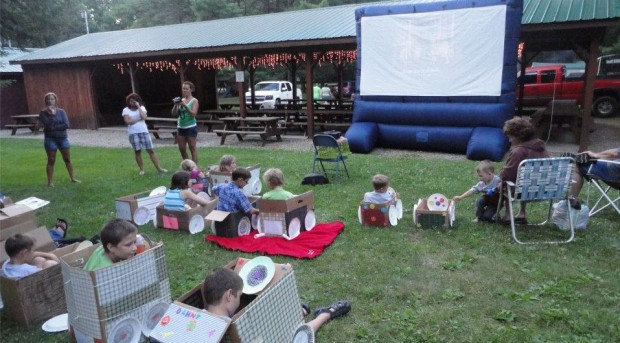
The Payoff
Building and starting a campground is “24/7 work,” Andrea told Small Business Trends, adding that even after you’ve physically built your site and celebrated your grand opening – the real work has only just begun.
She says, “You can’t buy a campground and expect to just hire people and have your old lifestyle. It’s a totally different lifestyle. After 20 years, we finally built a real log home and have hired a manager.”
But the hard work has paid off, and Camper’s Paradise has become somewhat of a luxury campground – or what many now call “glamping,” which refers to bringing the world of luxury into nature.
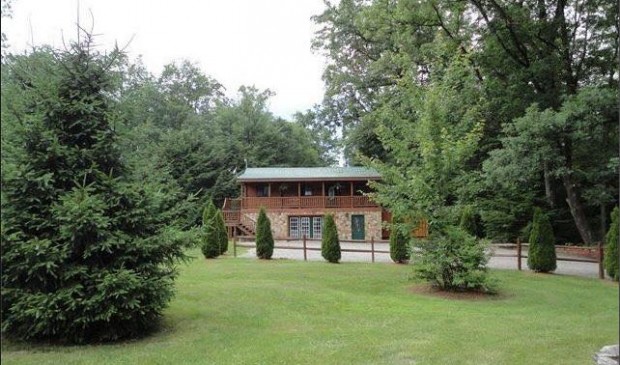
There are luxury cabins located across the street from the main site that boasts four bedrooms, two bathrooms, a fireplace, hot tub and HDTV. Each cabin is housed on its own acre of land. There are also two primitive cabins on-site, for those seeking a more rustic camping experience.
The learning curve never really straightens, however. There was no Facebook or social media of any kind when Camper’s Paradise was born in the 1990s.
The Internet was a new thing. Andrea and Mike understand the importance of being on social media sites, but worry that if a customer has one negative experience, they could post a devastating review online.
The Marketing
They’ve also learned that putting 2 x 3 ads in local newspapers (“they just wind up becoming birdcage liners,” Andrea says) is a waste of money.
Instead, they rely on the Internet, charity events, and local radio to get the word out about their business. They also hired a brochure distribution company to advertise the campground to a wider area.
The Steeles put a lot of time and money into their dream business (“It was six years before we could go on a family vacation,” Andrea said) but the family now has their dream home again, they are their own bosses, and they bring people joy and relaxation for a living.
They gave up everything – so that they could have the world.
Images: Campers Paradise.net





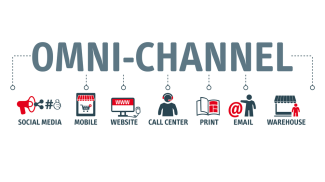

mike
Besides having level ground, where do i begin? What are the zoning laws requirements to have a campground?
Ric
I would start with a course on managing an RV park. They should probably address most questions in running the park with that info you could have a better idea of setup.
I also have thought about it. Here is what I can help with… I can tell you it won’t be cheap.
1. Learn all you can about running a campground.
2. Think about all the campgrounds you stayed in and what you liked and didn’t like. Don’t make those mistakes.
3. search for property. You could get a lot of info online now. Start with the counties Auditor site and then the townships site you could get all the codifications online. From here you will know whether you can have a campground and what permits and costs involved. There is no way around getting your zoning commissioner involved. So go to them with the intention of asking for their help in making it happen. Most people will appreciate that you ask for help rather than demanding and saying how ridiculous the zoning laws are. After all, it’s their job you would be attacking.
4. After all that is complete get a drawing of your property. Pencil out the campground as you would like it to be and conforming to all the zoning laws and buffer zones.
5. seek help from an excavator to rough out the sites and roads.
6. Seek help from a plumber and electrician to plan and cost out the running of electric and water/sewer. (I’ll bet the township won’t let you do anything like that on your own. Secondly, you have to think of who will insure and what their requirements are.)
That is just the basics. If you price all this out and still go forward… You are lucky and well driven.
Victoria J.
these were very helpful tips for someone like me that is just getting started and not even sure which direction to take the first step. thanks!
South Mao
Thank you
For sharing
I’m looking for a land myself to open a campground in Maryland or New Jersey
Looking for the right price and low in property tax
I been do some homework and still researching
Doc
First of all this event is not a typical RV park nor a typical RV park build.
This is an impressive top shelf park which is what very few people can afford to own unless they are well off and then I ask, why do this at all if you are well off. Go enjoy life in an RV/boat/mountain cabin/beach/etc.
You can, outside of land, build an RV park, at a ‘crawl’ stage working to a ‘walk stage’ and finally to a ‘run’ stage much cheaper.
A single septic system will handle 5 spaces ‘generally’ and costs about $6000.
Water from a meter or well ‘not including the cost of a meter or a well’ runs about the same $6000
Electrical, overhead, can run as little as $6000 as well with 30/50 amp service to each space.
Yes, you would have to do some of the work yourself like grading, mowing, planting, watering, cleaning up but in the end you build out of what you earn instead of out of your pocket other than the very first phases.
You have grading and gravel and hopefully some grass or ground cover you can plant easily plus a laundromat.
You are not required to have a ‘bathroom or restroom’ for the campers since the have one in their campers.
You would want to get them installed as part of the ‘walking’ phase and add 5 more sites with an additional septic system.
You can collect rent in person daily or weekly or monthly but I do suggest you have the license plates of all vehicles recorded and filmed and drivers licenses photographed.
One cannot make money in these endeavors by jumping into the deep end with sharks unless you happen to have the money.
Over a 5 year period you can add 5 spaces per year and end up with 25 to 30 spaces for about $150k invested in a plain simple well kept up RV park plus the cost of land and water meter or well.
$150k over 5 years is $30k per year and at $30 per night you would have to have 100 nights where all 10 spaces are rented out to break even. Everything over 100 nights is money in your pocket since you will never pay any taxes on the property if you use proper accounting procedures.
If you only had 15 spaces rented out every night for a year you would gross over $160k.
You can always build it up later but do so out of earnings not out of your pocket.
This is of course my opinion as a retired master plumber/electrician/HVAC contractor/Builder.
Good advice. We are in the middle of adding high end sites and these figures are right on for a new park construction. The goals can be met at a quicker velocity by looking at historic fill rates on an existing property.
Tanya
Hi there Doc
Your advice was very clear. I am a single mother with a little in my pocket wishing to create a more stable environmental and economical future for myself. I have been seriously toying with the idea a campground and if you have the time would love to discuss this further with you. Please let me know and we’ll find a way of exchanging details which is not so public. Thanks Tanya
Victoria J.
great insight! very helpful for someone starting out a lot slower and with less investing capital. Thank you!
Amanda
Wow thanks for the advice you really helped me!
Amanda
I was replying to Doc not the story he made so much sense and answered about 70% of my questions perfect without feeling defeated before starting the way he explained it was on point. It was good knowing I didn’t waste time reading through pointless articles to get to the last page with none of my questions answered ! Thanks Doc
Eric
Good high level analysis. No way do you end up with $160,000 with those numbers though. Monthly utilities aren’t figured into that. As well as liability insurance, separate smaller liability claims, not worth filing. Repairs and maintenance of the utilities as well and on and on. Utilities bills alone would more than likely run $1500 per month, probably closer to $2000. Not trying to criticize, it’s just reality.
Paul Ladendorf
My thoughts exactly. People these days just think you have to do what everyone else does and so they look at something like a campground as impossible because there’s too much red tape and its too expensive.
You don’t have to build in a county with zoning which will make it MUCH SIMPLER and cheaper. You don’t have to do 100 sites at the outset. You don’t need to build a fancy office (you can use a camper), I guarantee I can get a site done for way less than $15k, etc. etc. etc.
If that’s your dream, think outside the box and make it happen.
Paul Ladendorf
@ Eric, he said gross, not net. Its best to understand basic business financials before commenting.
Wanda L.
Thank you. Your info is great. I like it much better than the original article. More down to the basics. Thank you, again
jcamp
I dont knock the article but writing the story of a family who were already making more money than 90% of the country is not a “How To” article for the average American.
I am looking at possibly starting a campground in NE TN. I make 35k a year and my wife does as well and even we make twice what the average family makes in our area.
It may not even be feasible for us to do this as it will require probably a lot more capital than what we can afford.
What is truly sad is that the govt makes it next to impossible for average Americans to start a legitimate business.
Vince
So why not figure out a way to make things happen for yourself vs. going into it already defeated? The article never mentioned what the couple made before their adventure, so how is it an issue of them “already making more money than 90% of the country”? Whether that’s true or not, their journey is a culmination of planning, hard work and a desire to have a family business, so why not learn from their experience and start planning your own? I applaud this family as giving up your careers, especially with children, is a MAJOR life event. I know this as we too are doing the same. We left our careers last week to pursue a similar adventure and are in the beginning stages of planning everything out. Love their story and we can only hope to be as successful as them!
Great article and good luck to the family!
David
Check out the Small Business Administration. Things are going to be looking up for people wanting to start a small business. This Administration is going to change the banking laws so that the small banks that were wiped out in the last 10 years will come back and banks will start lending money to small business again. Start planning your campground now and put the numbers together. SBA will be there to help you when your ready with a full plan.
glenn JOHNS
There are hundreds of thousands of everyday people starting businesses everyday. You may not be able to start the one you want, or one with high start up costs, but you can always start one to get you to your next on. Don’t concentrate on what you can’t do, concentrate on what you can.
Patricia OConnell
I have started a campground and it really is hard work, but it is rewarding work. The people are wonderful to deal with. They are campers and they are the nicest people. I face new challenges every day, but by figuring them out and meeting those challenges is so exciting. I just wish I had started years earlier, because I have so many ideas to make things better. I started with just a lap top and a empty building.
You should see us now and after only four years.
Christine Gates
I am investigating a start up campground that I’ll turn permanent tiny house development. Has anyone had any experience w this?
Leisa Wilson
Christine, I too am reaching building a tiny house camp ground. I own the land to build on but I know nothing of how, what or where to start! Any help would be appreciated!
Jess
Where are you located? I have been considering this in my area of Northern Virginia
Jill
I am looking to speak with any who have developed a tiny home community. I bought a dying mobile home park and am turning it into a tiny home community. Infrastructure is in already but very old, most needs up grades. Next month will be building a tiny home on site , hope to host thow workshops throughout the build.
Does anyone know what tiny home community dwellers want? I am looking at installing solar panels wired into the main meter to offset energy costs, anyone gone solar?
My family purchased a campground in 2000. I worked the business for the first 3 years while in graduate school, took a long deserved break from the business, then took over the full operation in 2013. Something you should be aware of when dealing with tiny homes is that they are not all considered RV’s. If you build one yourself it is not automatically a certified RV. If it is not legally considered an RV then it is treated as a mobile home. Different laws, different rules. An RV has a green metal placard showing it to be an RV, normally near the door. At least that is the case with ours in Ohio. We have sleeper cabins which are the equivalent of a tiny home in structure, size and amenities. However, they are considered an RV because it they were built to be RV’s and have the certification.
Brooke Nilson
Patricia, we are looking into starting a campground in Utah. May I ask in which state you are located? You sound positive!
Cyril
How can I reach you? I would LOVE to pick your brain!
Victoria J.
Hello Patricia,
I would love to talk with you about the challenges you had in your first 2 years with getting started with an empty building. I have a very similar situation and think you could help me greatly. Also, what state are your campgrounds in?
Please reply back if you are willing to speak in a more private forum. Thank you!
Deborah
Where is the “learning how …” in this article? This is just a very short blurb about a relatively well-off family who bought a ready made campground and put in improvements over the years. I want to know how to create a campground from scratch on property I own. Not how to buy one that already exists.
Jennifer
I thought the same thing – if anyone has any real resources, that would be helpful! Buying a campground and building a campground are two totally different things!
Ron
Then do your research. They explained what they did, some of the potential pitfalls and costs, agencies they dealt with, and more importantly how the relative ease of what they accomplished changed from the time they began. There is no substitute for one’s own effort
Josh
I am a co-owner of a family run campground which my dad and uncle built from nothing, with my help ;). It was just an old farm when they bought the land. Here’s the most important advise… location, location, location! People camp for two main reasons, the experience or they are on there way somewhere. Depending on the location your business might be a mix. If they are coming for the experience you need to do everything possible to make that experience great and memorable! That includes first and foremost the campsites! If you don’t get those right in the beginning you will spend years fixing them if you don’t go out of business first. Make sure they are an adequate size and make sure they are easy to get into and out of. RV sites should be slanted a lot to allow easy access. Make sure your roads are easy to navigate too. Next would be amenities and customer service is huge in this business. Also, pre-plan for future expansion. Think about where additional sites and roads would go, but I can’t stress this enough. The details matter! Your RV and or tent sites and possibly cabins are your primary product. If your product sucks the rest won’t matter.
Arda
Live NW Fort Worrh, Tx. Lotta snowbirds this area. Already have land on side of tall mesa plus alpaca barn we could use for laundry, fire pits, covered community grilling area. Barn has water and elec…Easy access off paved road.. Retired and wanting build for future bus for family. How do we start?
Chrissy
Any advice on providing cable & internet. I currently have 16 RV lots in a rural Mississippi town. Not sure where to start searching on how to provide these services to renters.
Violet Newell
We live in CA, and need to redo our house out here. Sad part is that right in the center of MS 3 miles off the beautiful Natchez Trace we have a little day cottage on a 4.5 acre lake in the middle of 80 acres. The other half thinks we should sell it to finance CA, but I want both! Why can’t I sell memberships limited to 250 people, say $5000 for a 10 year membership, with a $250 a year upkeep fee?
My goal would be to redo CA as well as build up more on the lake such as putting in some RV pads, a swimming pool, a few cabins, a big garden as well as a small cafe and a pavilion. There is a dock to fish off of as well as a porch to BBQ on at the cottage. Some paddle boats with fishing gear would be available, as well as Stand Up Paddle Boards. A large floating sun deck will be in the center of the lake. The lake is fed by an underwater spring. So where should I start? Big ideas with little money due to property, but short on cash. Not eager to go deeper in debt if it can be prevented.
Chrissy
Violet, small world. I am writing from the middle of MS & a few miles off the Natchez Trace. My husband & I rent rv lots on our property in Port Gibson.
Stephaney Green
What type of zoning to look for when seeking vacant land for campground or rv park. I am looking for one to put tiny homes or storage containers
amal
Hi, i’m planning to start an rv/campground. Can anyone help with a business plan in excel format?
Chip
How did you make out stating camp ground I’m trying to do the same thing do you have any ideas
I’m at the very first stage of building a campground. I’m building it on 150 acres on my land in Southern Vt. I will let you know how I make out and I appreciate any input.
Gwen Coleman
Would love to connect and learn how your project & progress are going… or from anyone else thinking about this type of project! Gwenners79 is my email at the popular Gmail
Craig Hill
Too many ads…hard to send my info..
TIFFANY
I want to build a barndominium on 20 acres with a creek to have a venue with no limits on occasion, small farm, and campground along the creek i need someone to help look into what I need to get this started. Where do I start?